May moves most quickly, and here we are again with another edition of Charlottesville Community Engagement, a newsletter and program that seeks to capture as much as possible about the rapid movement that appears to be experienced by so many. The goal is to give a quick look or listen at what’s going on as often as possible. This is the 374th episode hosted by me, Sean Tubbs.
On today’s program:
The Charlottesville Area Association of Realtors releases its latest analysis of the Charlottesville market
Albemarle and Waynesboro are receiving more funds to electrify buses
Virginia localities to get more funding for Chesapeake Bay pollution reduction
The Albemarle Board of Supervisors adopts its budget for FY23
But the six elected officials are in a stalemate over how to proceed with grass or artificial turf at new athletic fields
First shout to JMRL’s How To Festival
In today’s first subscriber-supported shout-out, the Jefferson Madison Regional Library will once again provide the place for you to learn about a whole manner of things! The How To Festival returns once more to the Central Library in downtown Charlottesville on Saturday, May 14 from 10 a.m. to 1 p.m. There is something for everyone in this fast-paced, interactive and free event!
There will be 15-minute presentations and demonstrations on a diverse set of topics. Want to know how to do a home DNA test? Tune a guitar? What about using essential oils to repel mosquitoes? Visit the library website at jmrl.org to learn more. Schedule is coming soon! That’s the How To Festival, May 14, 2022.
CAAR reports on activity in first three months of 2022
A lower inventory of available homes continues to drive up the sales prices in some parts of the region. That’s according to the latest quarterly report from the Charlottesville Area Association of Realtors covering the first three months of this year. .
“In the first quarter, the median sales price was $389,900, which was up 13 over a year ago, a gain of nearly $45,000,” reads the report.
A total of 888 homes were sold during January, February and March. That’s 177 units fewer than in the same period in 2021.
The report notes that inventory may be on the rise. A total of 1,327 building permits were issued in 2021 in the six localities covered by CAAR and that’s the highest number since 2006. Activity has increased this year as well.
“In January and February, there were 286 new construction permits, which is up significantly from prior years,” the report continues. “In the first two months of 2022, more than 70 percent of new housing permits were for the construction of single-family homes.”
However, the report also notes that interest rates are beginning to climb with the average interest rate for a 30-year mortgage at five percent for the first time in eleven years.
As for sales prices, all six localities saw increases in the median sales price.
Albemarle’s average is $476,750, an 11 percent increase since 2021’s first quarter
Charlottesville’s average is $412,000, a four percent increase
Fluvanna’s average is $335,263, a 24 percent increase
Greene’s average is $335,000, a seven percent increase
Louisa’s average is $282,651, a 22 percent increase
Nelson’s average is $308,500, a 17 percent increase
Tomorrow I will be posting an anecdotal summary of transactions in the city of Charlottesville and paid subscribers to this newsletter will get a first look. Take a look at the past 15 on the Information Charlottesville archive.
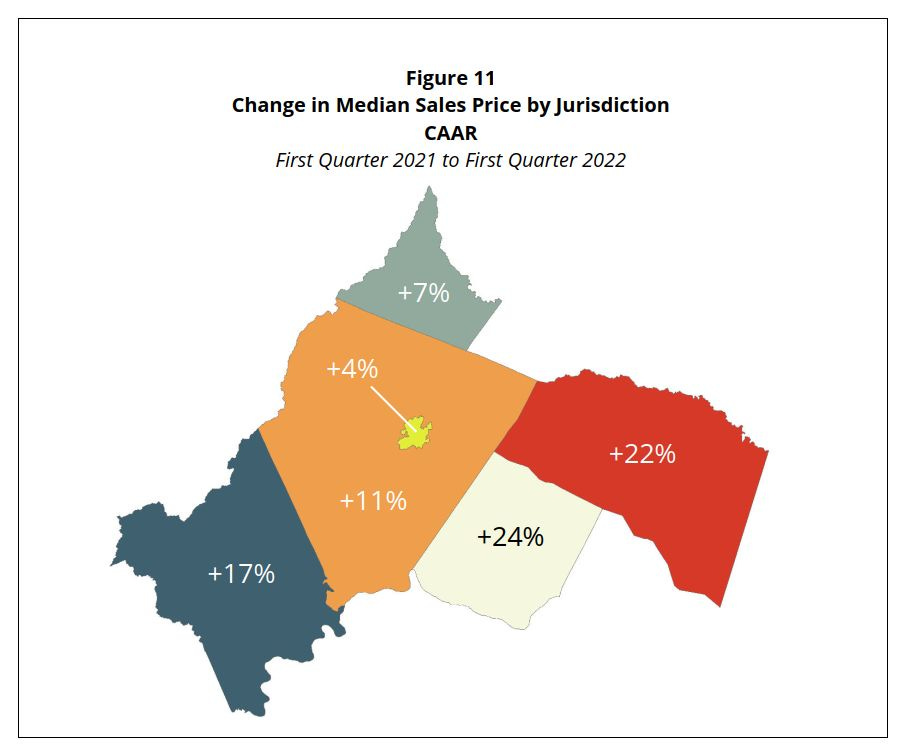
Virginia DEQ to award $14 million for electric school buses
More state funding is on the way to help localities make the transition from diesel-powered school buses to electric ones. The Virginia Department of Environmental Quality announced Wednesday that the Clean School Bus Program will award more than $14 million across Virginia, and that includes Albemarle County.
The funding comes from Volkswagen, a company that lied to its customers about the fuel efficiency of some vehicles. Virginia received $93.6 million from the Volkswagen Environmental Mitigation Trust.
“DEQ has also committed funds for innovative clean transportation projects including electric transit buses, medium and heavy duty trucks, electric equipment at the Port of Virginia and development of a statewide charging network for electric vehicles,” reads a press release.
Albemarle County will get $464,754 for two more electric buses, bringing the total fleet to four. Last year, the county received $530,000 from the same fund. (previous story)
Waynesboro will receive $1.4 million for six buses.
For more information about the Volkswagen settlement, visit this dedicated website.
Virginia gets funding for Bay clean-up efforts
Last November, President Joe Biden signed the Infrastructure Investment and Jobs Act which included $238 million in funding for programs to reduce pollution that makes its way into the Chesapeake Bay.
This week, the U.S. Environmental Protection Agency announced that $40 million will be made available through two separate programs.
“I am pleased to announce the new funding that will help support ready-to-go projects throughout the 64,000-square-mile Chesapeake Bay watershed,” said EPA Deputy Administrator Janet McCabe in a news release. “This unprecedented funding can go straight into projects that will protect public health, improve water quality and help restore lands, rivers and streams that impact the Chesapeake Bay – from farm fields to suburban neighborhoods to city streets.”
First, $15 million will come from the Most Effective Basins (MEB) program. Virginia will get over $3 million from this pool of funding.
“The funding will largely support farm-based actions to improve local rivers and streams in locations most beneficial to the downstream Chesapeake Bay,” the release continues.
The other $25 million will be administered by the National Fish and Wildlife Foundation through two grant programs. Specific awards will be made in September.
One group that is often a forum for local efforts to meet pollution reduction controls is the Rivanna River Basin Commission. They meet next virtually tomorrow at 2 p.m. (meeting info) (RRBC agendas)
Second shout-out: The Plant Northern Piedmont Natives Campaign
It’s springtime, and one Patreon subscriber wants you to know the Plant Northern Piedmont Natives Campaign is a grassroots initiative of motivated citizens, volunteers, partner organizations, and local governments who want to promote the use of native plants. This spring the group is working with retailers across the region to encourage purchase of plants that belong here and are part of an ecosystem that depends on pollination. There are plenty of resources on the Plant Northern Piedmont Natives Facebook page, so sign up to be notified of lectures, plant sales, and more!
Albemarle Board adopts $586.3 million budget
The Albemarle Board of Supervisors took eight actions yesterday to complete the process of development and adopting a budget for FY23. They began with the tax rates. (view the presentation)
“We have the real estate, mobile homes and public service tax rate of 85.4 cents (per $100 of assessed value) that is the calendar year 2022 rate,” said Andy Bowman, chief of the Office of Management and Budget in Albemarle. “For personal property rate, which also applies to machinery and tool taxes, the current rate is currently $4.28 cents per $100 and it is proposed to be reduced to $3.22 per $100 of assessed value.”
The reduction is due to the increase in value of used vehicles due to reduced production. Many localities in Virginia opted to decrease this amount, though Charlottesville City Council opted to keep their rate at the higher one.
In the next three items, Supervisors had to vote on an increase in the food and beverage tax from four percent to six percent and an increase in the transient lodging tax from five percent to eight percent.
“And finally the disposable plastic bag tax which would be five cents for each disposable bag and that would go into effect on January 1 of 2023,” Bowman said.
Supervisors adopted those tax rates with no discussion. All of that took place at the seven work sessions held since the budget was introduced in late February. All of those tax rates add up to a budget that anticipated $586.282,008 in total revenues for FY 23.
“That is a number than is greater than the Board last saw, due to some changes primarily in the school budget,” Bowman said.
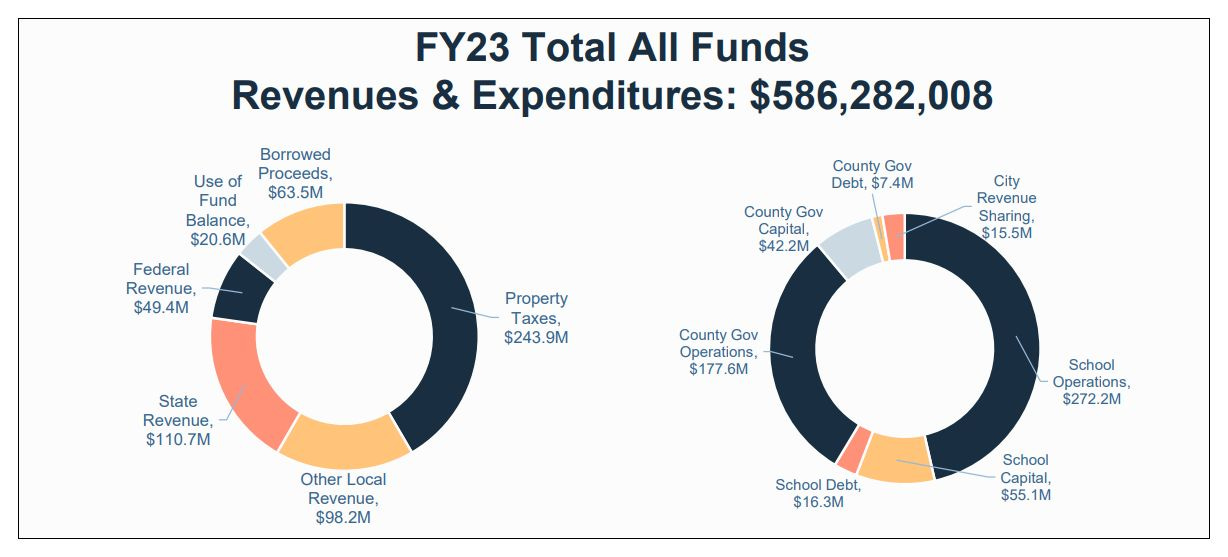
Those changes include additional funds for the school system related to reclassification of federal funds as well as $12 million in funding for the school that came down from the American Rescue Plan Act.
Virginia has not yet adopted its budget as the divided General Assembly did not reach consensus on one. Bowman said that means there is about $5 million in funds in question currently set aside as a placeholder.
“The current county budget includes $3.6 million in state funding that is currently in question with the impasse at the state budget,” Bowman said. “The Board of Supervisors previously asked the public schools what is the fallback plan if that state funding comes through? This plan is responsive to that direction so if the state keeps that $3.6 million intact, the school board would use that $3.6 million in one way. If that $3.6 million were to fall out of the state with an alternative approval for how that would be used.
Stalemate continues on synthetic turf fields
One issue that has come up during the budget process has been how to proceed with plans to update athletic fields managed by the Parks and Recreation Department. The original budget envisioned those being installed as grass fields at the future Biscuit Run Park, but at least three Supervisors sought to instead move forward with a previous plan to build synthetic turf fields at Darden Towe Park.
Some such as Supervisor Ann Mallek continued to want to keep those fields natural. The topic was discussed extensively at the work session on April 27, and the county executive prepared a potential way to move forward.
“If the Board were to show a majority or a consensus today that we would like to explore increasing the quality of the fields at Darden Towe, the first step would be to go out and get an expert in the turf management world to come in and do an assessment,” said County Executive Jeffrey Richardson.
That process could take a year and might mean taking the fields off line for some time. Richardson said the first step would cost about $20,000 and he asked the Board if they supported that pathway forward. However, that proposal was not included in the budget before the Board.
Supervisor Ned Gallaway asked what this study would give the county that it didn’t already know before.
“What it gives us is a detailed plan of execution,” said Trevor Henry, the assistant county executive. “A nutrient plan, things like aeration, lime, fertilizer, a seeding schedule, weed and pest control, a mowing schedule, a watering schedule, and a rotation. Those would be some of the outcomes of that.”
Supervisor Diantha McKeel made a motion to adopt the budget that did not include spending that $20,000 for the consultant. Supervisor Ann Mallek made a counter motion to amend the budget to include that funding.
Supervisor McKeel wanted to move forward with synthetic turf as recommended by staff in 2019 to put lighting and artificial turf at Darden Towe.
“In 2019, Albemarle County had nine organizations representing over 7,000 participants that were requesting rectangular field space,” McKeel said. “It was evident in ‘19 that Albemarle County not only lacked the available fields but lacked the ability to provide quality fields based on high usage.”
McKeel said artificial turf was not her first choice for grass athletic fields, but she supported their use at Darden Towe, which is considered an urban park.
“A mudhole is not an environmental success, nor is asking people to play in goose poop an environmental success,” McKeel said.
Supervisor Mallek said natural grass fields are safer for those who play on them. The topic was discussed extensively at the April 27 work session.
Gallaway said he did not support the motion because it would delay what he said was a need to provide fields. He supported synthetic.
“We’ve had in front of us an option that would fix our system of fields that would increase capacity, that would increase quality everywhere, not just for the current fields but for the future fields that would come into the system,” Gallaway said.
Supervisor Donna Price also did not support the motion.
“I call foul on that proposal and think we’re just simply kicking the can down the road,” Price said. “It’s been years that we’ve known our fields are inadequate and that we needed to do something like this.”
Mallek’s proposal failed 3-3, which is a stalemate. That means the adopted budget does not include a decision point on how to proceed with athletic fields. .
Other actions taken to complete the budget include a resolution for appropriation of $18 million for FY23 in FY22, a borrowing resolution, and a resolution to adopt the Capital Improvement Plan for FY23 through FY27.
Now that the budget is complete, the process will next begin on creating a new strategic plan.
Help support Town Crier Productions with a paid subscription to this newsletter!
For one year now, Town Crier Productions has a promo with Ting!
Are you interested in fast internet? Visit this site and enter your address to see if you can get service through Ting. If you decide to proceed to make the switch, you’ll get:
Free installation
Second month of Ting service for free
A $75 gift card to the Downtown Mall
Additionally, Ting will match your Substack subscription to support Town Crier Productions, the company that produces this newsletter and other community offerings. So, your $5 a month subscription yields $5 for TCP. Your $50 a year subscription yields $50 for TCP! The same goes for a $200 a year subscription! All goes to cover the costs of getting this newsletter out as often as possible. Learn more here!





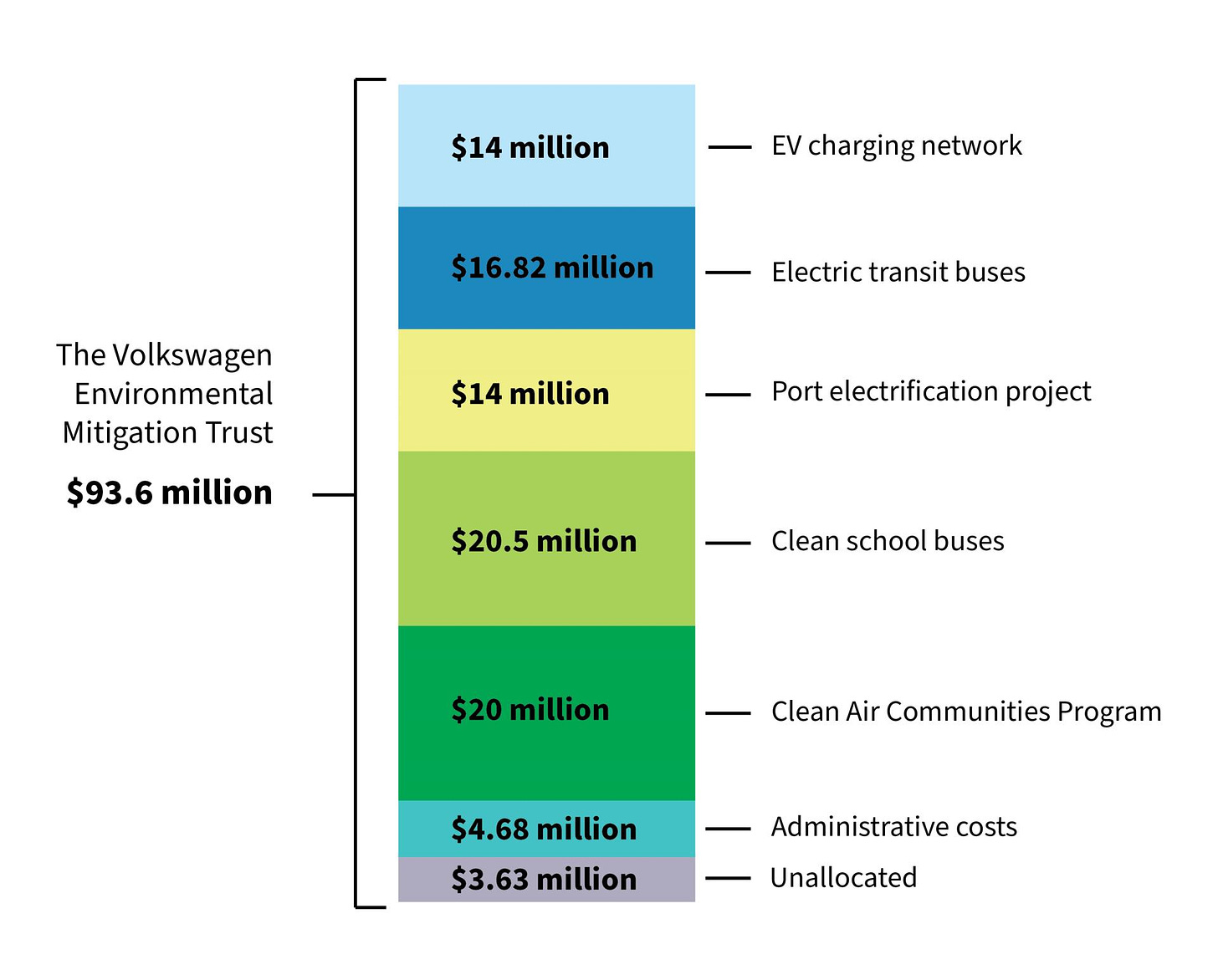
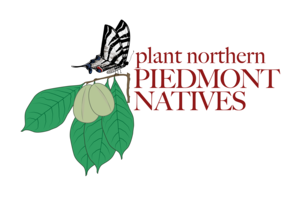
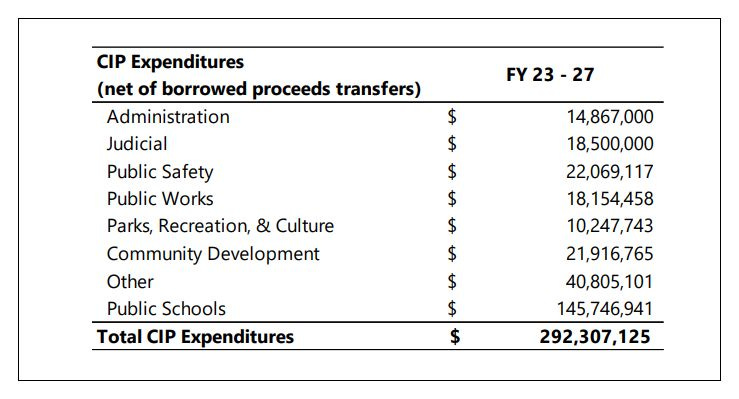







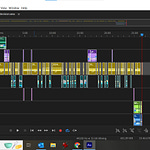

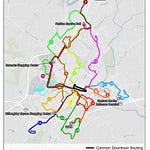
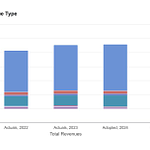
May 5, 2022: Supervisors agree to adopt $586.3M budget but stalemate on athletic fields continues